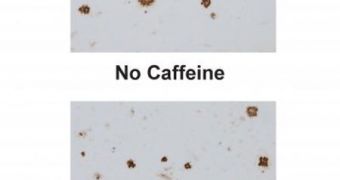Experts from the University of South Florida, Alzheimer's Disease Research Center have determined in a new study conducted on unsuspecting mice that the memory impairment brought forth by Alzheimer's disease can be counteracted with the equivalent of five cups of coffee per day. In their experiments, the researchers gave mice specifically bred to develop the disease doses of caffeine, which allowed the rodents to regain access to their memories.
The team also managed to demonstrate that the young mice of the same genetic traits that were given caffeine since early adulthood also failed to exhibit the symptoms regularly associated with the disease, which means that coffee could also play a role in preventing the onset of the disease altogether. Details of this line of research were published yesterday (July 5) in the Journal of Alzheimer's Disease. In older specimens, the treatment significantly reduce the levels of proteins regularly associated with the neurodegenerative disease.
“The new findings provide evidence that caffeine could be a viable 'treatment' for established Alzheimer's disease, and not simply a protective strategy. That's important because caffeine is a safe drug for most people, it easily enters the brain, and it appears to directly affect the disease process,” explains ADRC neuroscientist Gary Arendash, PhD, the lead author of the new study and an expert with the University of South Florida. Study investigator Huntington Potter, PhD, who is also the director of Florida ADRC, says that the team plans to move for starting human trails as soon as possible.
The team primarily wants to test the coffee treatment on seniors with early signs of the disease, and preliminary results are encouraging. They've already determined that, in healthy seniors, caffeine has the same effects on the blood levels of β-amyloid as it does in mouse models.
“These are some of the most promising Alzheimer's mouse experiments ever done showing that caffeine rapidly reduces beta amyloid protein in the blood, an effect that is mirrored in the brain, and this reduction is linked to cognitive benefit. Our goal is to obtain the funding needed to translate the therapeutic discoveries in mice into well-designed clinical trials,” Potter explains.
Arendash also underlined the fact that the new study was conducted under highly-controlled circumstances, and that the effects of caffeine were clearly separated from other health factors, such as diet and regular exercise. The interest that the team took in the drug came after a Portuguese study, made several years ago, showed that people who consumed less coffee over two decades were more likely than others to develop neurodegenerative diseases.
“This suggests that caffeine will not increase memory performance above normal levels. Rather, it appears to benefit those destined to develop Alzheimer's disease,” the expert concludes.

 14 DAY TRIAL //
14 DAY TRIAL //